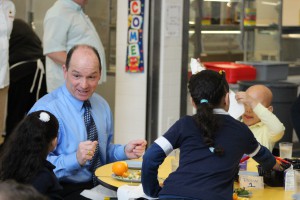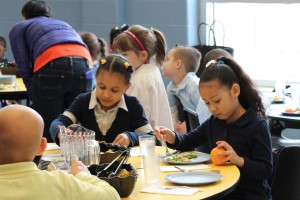
Frustrated with serving “satellite” lunches, the term for the cellophane-covered lunches prepared and packaged in factories and then shipped to schools, William H. Ziegler Elementary School principal Paul Spina put “improving school lunch” on his to-do list.
Students were throwing more than half of their lunch in the trash and out-right complaining about the quality. He knew that if they left school hungry, they were most likely going to fill up on food from one of the school’s nearby fast food places or mini-marts.
“I needed to support them somehow,” Paul says.
Ziegler switched to full-service lunch, but Paul still wanted to amp up the impact.
And then, almost by accident, he was introduced to the Vetri Foundation. He’d been making a plea at a School Reform Commission meeting about wanting to provide better quality lunches and actually utilize the food service equipment in his school’s cafeteria.
Kelly Herrenkohl, Vetri Foundation executive director, and co-founder Jeff Benjamin happened to be sitting in the audience.
After learning about the Eatiquette program, Paul was all in.
“This is an experience that my kids and this community aren’t going to get under any other circumstances,” he says. “I was willing to take on the extra work to make it happen.”
First, the lunchroom at Ziegler was transformed from its institutionalized look – bare, nondescript walls and long cafeteria tables – to a vibrant one featuring round tables and the school’s colors, blue and gold.

Paul says that the lunchroom has become a place where people want to be and that it’s strengthened the school’s community.
“It builds culture and a sense of pride. The teachers come out and sit with the students during lunch,” he says. “Which they are not obligated to do. It’s exciting, especially for my younger groups. They think it’s the best thing to have their teacher sit and eat with them.”
When Paul originally thought about changing school lunch, he was only thinking about the food. But, the change he’s witnessed in his school has been far-reaching.
“I tell my students that this is like dining in a fancy restaurant and their behavior reflects that,” he says. “They place the napkins in their lap and pass food around the table. They feel special and like someone thinks they’re important.”
― Danielle Zimmerman
(Originally published in the Vetri Foundation’s 2014 Year in Review newsletter)

